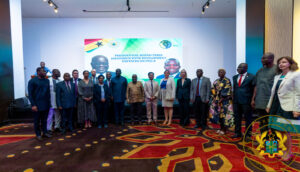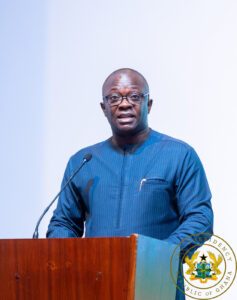The President, Nana Addo Dankwa Akufo-Addo, has urged international partners to align their development policies with those of the nation.
According to the President, the assistance offered by the foreign partners, particularly in the agriculture sector, risks duplication, which negatively impacts the anticipated results due to misalignment of the policies and strategies of both parties.
 “Government is concerned by this because projects designed by foreign governments to support Ghana’s agriculture should, naturally, align with Government’s priorities. Any deviation from this can amount to misdirected investments in the country,” he explained.
“Government is concerned by this because projects designed by foreign governments to support Ghana’s agriculture should, naturally, align with Government’s priorities. Any deviation from this can amount to misdirected investments in the country,” he explained.
President Akufo-Addo made this appeal on Thursday, October 26, 2023, at a presidential breakfast meeting with development partners on Planting for Food and Jobs 2.0, organized by the Ministry of Food and Agriculture (MoFA) in Accra.
The President further expressed another concern over what he termed an “unwelcome situation” where the government, through its agencies, has no “foreknowledge” of some funds been employed in the country by international development agencies.
WAYFORWARD
However, he was confident the platform provided an opportunity for both sides to identify the factors causing this disconnect and take corrective measures.
 He said such dialogues should be a regular occurrence, providing avenues to discuss challenges and successes and ensuring increased collaboration in the execution of current and future agricultural development plans in Ghana.
He said such dialogues should be a regular occurrence, providing avenues to discuss challenges and successes and ensuring increased collaboration in the execution of current and future agricultural development plans in Ghana.
The Ministry of Food and Agriculture not long ago held a similar roundtable discussion with financial institutions on financing agribusiness, during which he implored banks to allocate more of their portfolios to agribusiness development.
During his address yesterday, he acknowledged the multifaceted challenges facing Ghana’s agriculture, especially in relation to available funding resources.
President Akufo-Addo also touched on the urgency of complementing government efforts on PFJ II through resource mobilization and funding mechanisms such as loans, grants, and technical assistance.
TRANSFORMATION
The President expressed confidence to the international development partners that the second phase of the program, Planting for Food and Jobs (PJ II), was poised to continue the transformation of Ghana’s agricultural landscape.
He explained that the focus is on an input credit system that accommodates all value chain participants and will continue the progressive transformation of Ghana’s agricultural landscape.
It will be recalled that on Monday, August 28, in Tamale, President Akufo-Addo launched the second phase of the Programme for Planting for Food and Jobs, which is a five-year strategic initiative designed to accelerate the growth of the agriculture sector in response to the exacerbated challenges it has faced, primarily due to the combined impact of recent adversities like the COVID-19 pandemic and the Russian invasion of Ukraine.
 Anticipated to enhance food security and establish a strong comparative advantage in the production of diverse cash and food crops and poultry products by the end of the five-year implementation period, the President noted that the new “comprehensive approach will stimulate economic activities within the sector, generate employment, support industrialization, boost exports, increase incomes, foster rural development, and propel overall economic growth”, as well as “leverage competitively the opportunities presented by the Africa Continental Free Trade Agreement (AfCFTA).”
Anticipated to enhance food security and establish a strong comparative advantage in the production of diverse cash and food crops and poultry products by the end of the five-year implementation period, the President noted that the new “comprehensive approach will stimulate economic activities within the sector, generate employment, support industrialization, boost exports, increase incomes, foster rural development, and propel overall economic growth”, as well as “leverage competitively the opportunities presented by the Africa Continental Free Trade Agreement (AfCFTA).”
PFJ 2.0
In his welcome address, the Minister for Food and Agriculture, Bryan Acheampong, explained to the development partners what the PFJ 2.0 was about and the successes chalked up so far.
According to him, it is a five-year program with three phases—short, medium, and long terms—with a pilot phase from September to December 2023.
He indicated that the strategy document contains production targets to be achieved in each of the phases, ultimately reaching national food self-sufficiency by the end of the program in 2028.
“Without doubt, the success of the PFJ 2.0 program will depend on several factors. First, it would require the active participation of the private sector in the value chains, from input distribution through production, processing, and marketing,” he remarked.
 The other factors he mentioned were financing these value chain activities by banks and other financial institutions, increasing investment in supporting agriculture infrastructure and technology, and refocusing partners in agriculture on the task ahead.
The other factors he mentioned were financing these value chain activities by banks and other financial institutions, increasing investment in supporting agriculture infrastructure and technology, and refocusing partners in agriculture on the task ahead.
The Deputy Minister for Finance, Dr. John Kumah, on behalf of the Minister for Finance, Ken Ofori-Atta, stated the support his ministry had given to the MoFA through budgetary allocations and releases.
He told the development partners that the PFJ 2 was “not about charity but rather about partnership,” adding that the investment, including funds and knowledge, would be vital in this regard.
There were panel discussions with the international development partners, which included USAID, FAO, AGRA, WFP, GAC, the World Bank, African Development Bank, KFW, IFAD, and the European Union.









